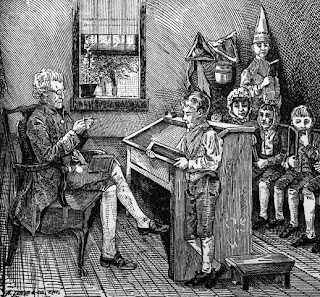|
The sons of a planter typically would be taught the basics at home. The boys’ school day started around 7 a.m. in the school room with their male tutor. They had several breaks during the day. Around 9 a.m. they had breakfast, and dinner was served from 2 p.m. to 5 p.m. The boys studied higher math, Greek, Latin, science, celestial navigation (navigating ships by the stars), geography, history, fencing, social etiquette, and plantation management. At this point, the sons of wealthy planters often were sent to boarding schools in England for a higher education. They sometimes stayed over in England to study law or medicine. Otherwise, they would return home to help their fathers run the plantation. The school days for girls were somewhat different. Girls learned enough reading, writing, and arithmetic to read their Bibles and be able to record household expenses. They were taught by a governess, who was usually from England and somewhat educated. They studied art, music, French, social etiquette, needlework, spinning, weaving, cooking, and nursing. The girls did not have the opportunity to go to England for higher education because this was not considered important for them. |
This entry was posted
on Sabtu, 07 Juli 2012
at 03.56
and is filed under
education
. You can follow any responses to this entry through the
comments feed
.

